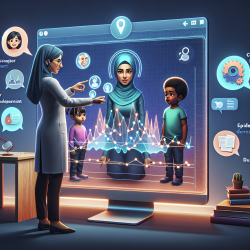Enhancing Skills in Online Therapy for Special Education
The COVID-19 pandemic has significantly disrupted traditional educational settings, impacting many Board Certified Behavior Analyst (BCBA) trainees' ability to accrue supervised independent fieldwork hours. The research article "School’s Out for COVID-19: 50 Ways BCBA Trainees in Special Education Settings Can Accrue Independent Fieldwork Experience Hours During the Pandemic" by Fronapfel and Demchak (2020) offers a comprehensive guide to help trainees continue their professional development during these unprecedented times.
Unrestricted Activities for Skill Development
Given the constraints on direct student contact, BCBA trainees are encouraged to focus on unrestricted activities that are essential for developing programs and plans for implementation. These activities are crucial for the preparation of behavior analysts and can be conducted using various web-based conferencing technologies. Here are some key unrestricted activities:
- Summarizing and graphing acquisition data collected prior to school closures.
- Designing, plotting, and interpreting data in various graphical formats.
- Reviewing graphed data of learner performance to make data-based decisions for future modifications to instructional plans.
- Reviewing data collection methods to determine the most appropriate methods for plans.
- Developing data sheets for behavior support and instructional plans.
- Researching literature to support instructional plans and response-prompting procedures.
Modifications to Instructional and Behavior Support Plans
As trainees review data and make data-based decisions, they can complete modifications to plans and develop additional behavior-analytic instruction and related data sheets. Researching instructional strategies, such as response and stimulus prompts, and planning for skill maintenance and generalization can be particularly beneficial. This research might aid trainees in developing plans to promote maintenance and generalization of skills through remote-learning procedures.
Similarly, analyzing Functional Behavior Assessment (FBA) results can help develop or modify behavior support plans. Research on relevant antecedent and consequence strategies can be conducted to ensure effective behavior support plans are in place.
Development of New Instructional Plans
Trainees can continue to develop and write new instructional plans for learners' skill acquisition via virtual teaching formats or for use upon school reopening. Supporting literature for instructional plans can also be researched and applied. This research can focus on behavior-analytic strategies such as response prompting, shaping, chaining, modeling, and video modeling. Role-playing these strategies with supervisors or in group supervision sessions can help trainees demonstrate competency prior to use with students.
Assessment and Preparation for School Reopening
Researching literature on preference assessments for students and preparing corresponding materials can be beneficial. Role-playing preference assessments with supervisors or in virtual group supervision sessions allows trainees to demonstrate competence before conducting them with students.
Although direct observations of student behavior in school settings are not possible during closures, trainees can prepare for conducting assessments upon school reopening. For example, they can work on indirect assessment methods linked to conducting an FBA to lay the groundwork for antecedent-behavior-consequence analyses of behavior.
Trainees can also conduct assessments related to identifying skill strengths and weaknesses for instructional planning. Standardized adaptive behavior instruments can be completed via third-party respondents, allowing trainees to score, summarize, and identify skill strengths and weaknesses for future instruction planning.
Research and Design of Supports Delivered via Telehealth
Despite the limitations of applied service delivery via telehealth, there are opportunities for trainees to accrue hours for unrestricted activities. Researching literature on effective parent training modalities and role-playing these methods during supervision sessions can be beneficial. Trainees can demonstrate competence using parent-training methods during telehealth delivery. Similarly, researching and role-playing effective staff training methodologies can help trainees demonstrate competence before implementation in a telehealth format.
If telehealth delivery is deemed ethically appropriate, trainees can provide instruction via this format to accrue hours for restricted activities with learners. This should be gauged in a risk/benefit analysis and implemented only if it leads to effective instruction.
To read the original research paper, please follow this link: School’s Out for COVID-19: 50 Ways BCBA Trainees in Special Education Settings Can Accrue Independent Fieldwork Experience Hours During the Pandemic.










